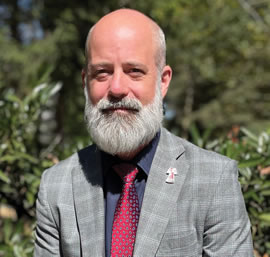 Tell us about your background and the path that brought you to unionism.
Tell us about your background and the path that brought you to unionism.
Born in Chilliwack, I grew up in a union family—though it was a different, blue-collar union. From a very early age I understood that collective solidarity was a support to individual workers that enabled them to achieve things they would not be able to alone. As a young man working in a non-union remanufacturing wood mill, I gained lived experience of the difficulties workers face without a union to back them up—particularly in terms of safety. I witnessed several life-changing accidents that were preventable, including the one that took my hand. That unfortunate accident did allow me to change my career path, and I chose to become a teacher.
Along that path I married, had two children, and worked while in college and university to complete my teaching education. When I got my teaching certificate, I worked my first five years in England, where we had two more children. My experiences teaching in England were not particularly enjoyable, but they did give me valuable insight into a very different education system. There they had four different education unions that individuals might belong to, often making it difficult to have complete agreement and solidarity between colleagues, a great lesson to learn.
On my return to BC, I was hired as a teacher in Chilliwack (where we had our last child), and I knew I needed to get involved in my local. A key belief I have about unions is that they are our (workers’) voices, and if I wanted to be heard I needed to contribute. My involvement led to being elected Local President, which I served as for three years. Being Local President meant representing members on the provincial level, and seeing that work made me want to become involved at that level. I knew it was a significant commitment that would affect my whole family, so only after much discussion with my partner Holly and our five children was I comfortable deciding to run for the provincial Executive Committee (EC). I was fortunate to be successful, and to continue to be successful as I pursued further positions as a Full-Time Table Officer. It is hard to describe to others the mixture of joy, humility, and obligation felt when elected to represent my colleagues across the province. It is not something that I ever would have imagined as a young man, and it is a privilege I do not take lightly.
What are your priorities for advocacy on behalf of teachers this school year?
Obviously, as it is a bargaining year, advocating for the need for better working conditions and a wage increase that keeps up with COLA (cost-of-living adjustment) is at the top of the list. This includes working hard to make sure that the public under-stands the increasingly complex and difficult workload of teachers, the increasing rift between salary and cost of living in our province, and how these are combining to make it harder to recruit and retain teachers in the public education system.
Also important is to continue advocating for the health and safety needs of teachers as the world shifts to functioning with COVID’s presence in the long term. We need to ensure that our members remain supported in making decisions about their own needs in terms of safety in their workplace. The wearing of masks and other steps that may provide layers of safety that members want and/or need must be an option supported by the employer. I look forward to working with Carole Gordon, First Vice-President; Robin Tosczak, Second Vice-President; and many other BCTF colleagues to make sure teachers’ voices are heard.
Do you have a bargaining update for members?
I would definitely suggest members go to bctf.ca to look at the updates that have been posted thus far; we have been working to provide up-to-date information regularly throughout this round in order to ensure members are fully informed. What I will say here is that while the tone and approach of the employer has been much more professional and allowed for bargaining to move forward between the parties with less needless acrimony and barriers, it doesn’t mean that it has been any easier to achieve our objectives. BC Public School Employers’ Association (BCPSEA) remains philosophically opposed to much of what we consider improvements to our members’ workloads, and the amount of money government is providing at the table to address salary (and members’ other real needs) is not nearly enough. Again, I encourage members to stay connected and engaged with updates so that they are prepared to make their voices heard when needed.
Any final remarks for teachers as they settle into a new school year?
Just that I hope they are able to still find the joy in their profession that drew them to it in the first place. The last couple of COVID years have put immense pressure on all of us, both personally and professionally. In a bargaining year, which brings uncertainty, they need to know their colleagues in local offices and at the provincial level are doing their best to support them and fight for their interests. The classroom and the relationships we create with the students we teach are still the things that remind us why we do this work, and also give us the energy to keep doing it. Take those positive moments of connection and learning as they come, and remember that each of you is still changing lives for the better.